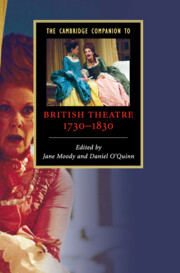14 - Opera in the London theatres
from Part IV - Places of Performance
Published online by Cambridge University Press: 28 May 2009
Summary
To say that the greater part of the English audience was suspicious of continental opera is an understatement. They found an entirely sung 'play' difficult to accept, disliked recitative, thought the plots ludicrous and treated opera with suspicion because it was 'foreign'. To such an audience, a genre with spoken dialogue called 'English Opera' (as opposed to opera in English) was decidedly preferable. Nevertheless, the arrival of Italian opera early in the eighteenth century was welcomed by that part of the public keen for something exotic and prepared to be charmed by the music, captivated by the stagings and scandalised by the singers. That these types of opera were used for different types of critical discourse emphasises the fact that Italian opera remained a separate and distinct force and indeed came to delineate a binary opposition in eighteenth-century culture.
This binary opposition manifested itself most obviously in the division of the repertoire between the London theatres. On the one hand, Drury Lane and Covent Garden put on mainly spoken plays; the all-sung operas staged there were usually afterpieces in English, though operas with spoken dialogue also appeared among the mainpieces in various guises, including ballad opera and burletta. There were three other venues for opera in English. The oldest of these was the Little Theatre in the Haymarket. Opened in 1720, it was an occasional venue for opera performances, including those in the summer under Samuel Foote from 1747 and George Colman the Elder's seasons from 1777. The English Opera House, later the Lyceum, which opened in 1772 and was first able to function as a proper theatre in 1809, was restricted to performing opera; not until the Licensing Act of 1843 was it allowed to present spoken drama. There was, lastly, the Olympic Theatre, which, for a short period in the 1830s under Eliza Vestris, was licensed to produce 'entertainments of music, dancing, burlettas, spectacle, pantomime, and horsemanship': the meaning of the term 'burletta' came to encompass almost any musical entertainment other than all-sung opera.
- Type
- Chapter
- Information
- The Cambridge Companion to British Theatre, 1730–1830 , pp. 205 - 218Publisher: Cambridge University PressPrint publication year: 2007
- 3
- Cited by

